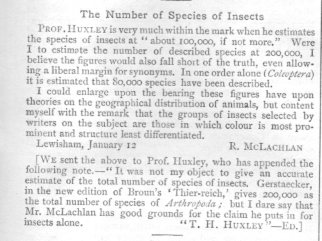JF Ptak Science Books Quick Post
"Insecte, an Insect; a small fleshlesse, and bloudlesse vermine, diuided (in some sort) betweene the head, bodie, and bellie, as an Ant, Fly, Bee, etc.; vnder which, the Earthworme, Caterpiller, etc. be also comprehended".--1611 R. Cotgrave Dict. French & Eng. Tongues, from the Oxford English Dictionary
The "insect" has been around on Earth for a long time, but only in English since 1589. (The OED has an earlier use of the word, but the Cotgrave is the most poetic.) And there have been lots of them--and so my interest in this short Letter to the Editor in the January 25, 1877 issue of Nature, in which the number of species of insects is discussed. Mr. McLachlan is the writer who questions the great Thomas Huxley on his round estimate, which is recorded at "about 100,000, if not more". Huxley responds and says that yes, the 100,000 is probably quite low. And of course he was correct. I suspect that then as now that insects were about the most varied groups if animals on Earth, and accounting for half of all organisms on the planet--today though the estimates of the number of species range above 10,000,000.
If there are 10 million species, I wonder about how many bugs there are, and about their combined weight compared to the biomass of the Earth? I don't have numbers for the big questions, though I do for the number of ants, which comes out to about 10 x 10^17--a big number, and just for ants.




Comments